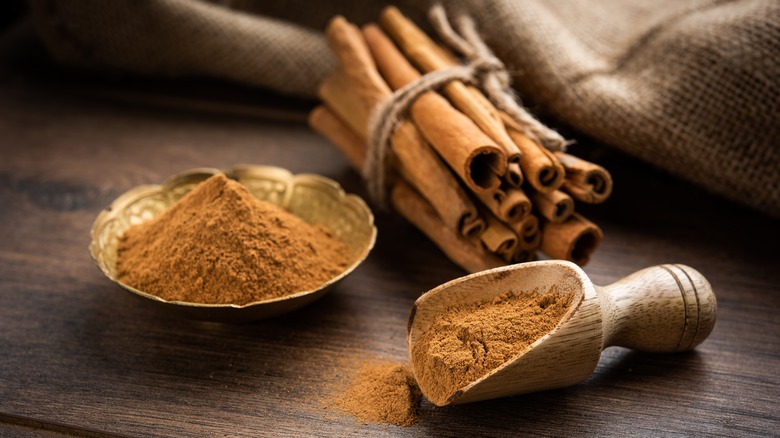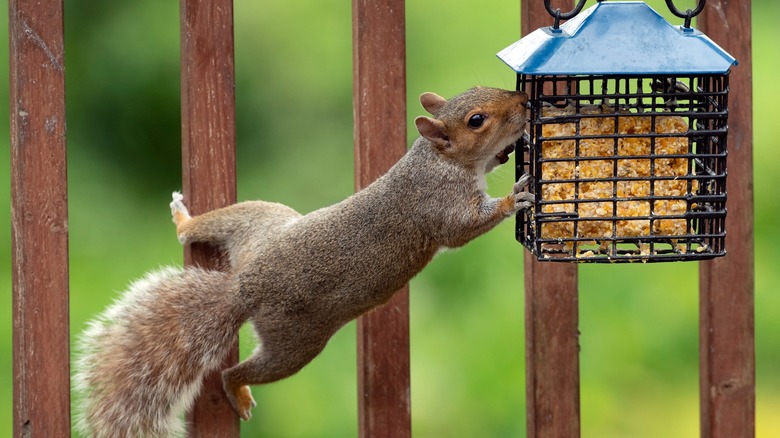Sprinkle A Little Cinnamon In Your Bird Feeder & Watch What Happens
Having a bird feeder in the yard is not for the fainthearted. As a responsible backyard bird enthusiast, you need to change the seed or nectar often and clean the feeder regularly. And, from time to time, you need to go to battle with little beasties like ants and squirrels. The answer to getting rid of bird feeder pests might already be in your pantry or sitting next to your diffuser. A little powdered cinnamon or a dab of cinnamon oil around your feeder may (note, we say may) scare away insects and mammals without harming feathered visitors — so long as it's the Ceylon cinnamon and not cassia.
Rats won't leave your bird feeder alone? Common critters that steal from your bird feeders include rodents (squirrels, chipmunks, mice, and voles) and small mammals like raccoons, possums, and skunks. Even deer are known to munch on birdseed if hungry. Nectar lovers peruse hummingbird feeders — insects like wasps, bees, ants; some lizards (particularly anoles); and, occasionally, sweet-toothed bears. Can cinnamon really deter all, or even just any, of these unwanted visitors? Maybe not, but evidence suggests it may help reduce visits from some of the most regular.
A significant factor to consider before you sprinkle cinnamon all over your feeders is whether birds are negatively affected by it. Questions about cinnamon's safety for birds likely stem from one of two primary concerns: people feeding unhealthy cinnamon-flavored products like cinnamon bread or cereal to birds, and the toxicity of cassia (Chinese cinnamon).
Is cinnamon safe for birds?
Pest control companies Avian Enterprises and Pest Defence, as well as online animal authority A-Z Animals, claim birds — specifically pigeons — are so irritated by the scent of cinnamon as to be deterred from landing on roofs or other structures treated with the spice. In New Zealand, bait treated with mammal pest poison 1080 is regularly coated in cinnamon oil (and colored green) in an attempt to deter the country's beloved native birds from eating it. However, as noted in a 2017 article in the New Zealand Journal of Ecology, efficacy depends on what part of the plant the oil is extracted from and how concentrated it is on the bait.
But you might be okay yet. First, there's the fact that birds have taste buds, just not that many. That means they may not be able to detect the presence of cinnamon in or around their feeder. Plus, cinnamon is generally considered a beneficial addition to bird diets. A 2021 IJFAF-published Nigerian study and another out of India published in Livestock Research International in 2019 suggest cinnamon powder supplement increases egg quality in chickens and quail. Cinnamon may even be an adequate replacement for antibiotics in chicken feed, research published in a 2011 issue of Livestock Science paper concludes. Parrot and other captive bird owners are also encouraged to give their pets cinnamon sticks to play with — though only Ceylon (true) cinnamon will do, as cassia, or Chinese cinnamon, contains higher levels of toxic coumarin.
Treating the pest problem
What about exoskeletal or fur-covered feeder fiends? The USDA National Cooperative Extension site Wildlife Damage Management suggests spraying squirrel-damaged trees with repellent containing cinnamon oil because the fluffy-tailed rodents don't like the taste. It's not unrealistic to think the same could apply to a bird feeder. According to the online pest control advice blog Pest Pointers, cinnamon's strong smell irritates nasal passages and masks the smell of bird feed, making it harder to find.
Ants are also purportedly repelled by the common culinary spice. Cinnamon stops "ants from approaching the feeding zones for hummingbirds," says Zach Hutchinson, ornithologist and owner of FlockingAround.com (via Homes & Gardens). Some commercial bird feeder ant repellents contain cinnamon oil, like Sapphire Labs Nectar Fortress gel ($16.90 for a twin pack at Walmart). Still, NestWatch, a Cornell Lab of Ornithology blog, mentions a nest box caretaker who tested the ant-cinnamon theory and found it wanting — it failed to keep ants out of bird nests.
Our directive to "sprinkle a little cinnamon in your bird feeder and watch what happens" holds up. Given the conflicting information on this trick, it's worth conducting your own experiments. If you decide to apply cinnamon, don't put it on the feeder itself. Instead, dust it onto the pole or hook of the feeder. This will reduce the risk of birds coming into contact with the potent spice.


